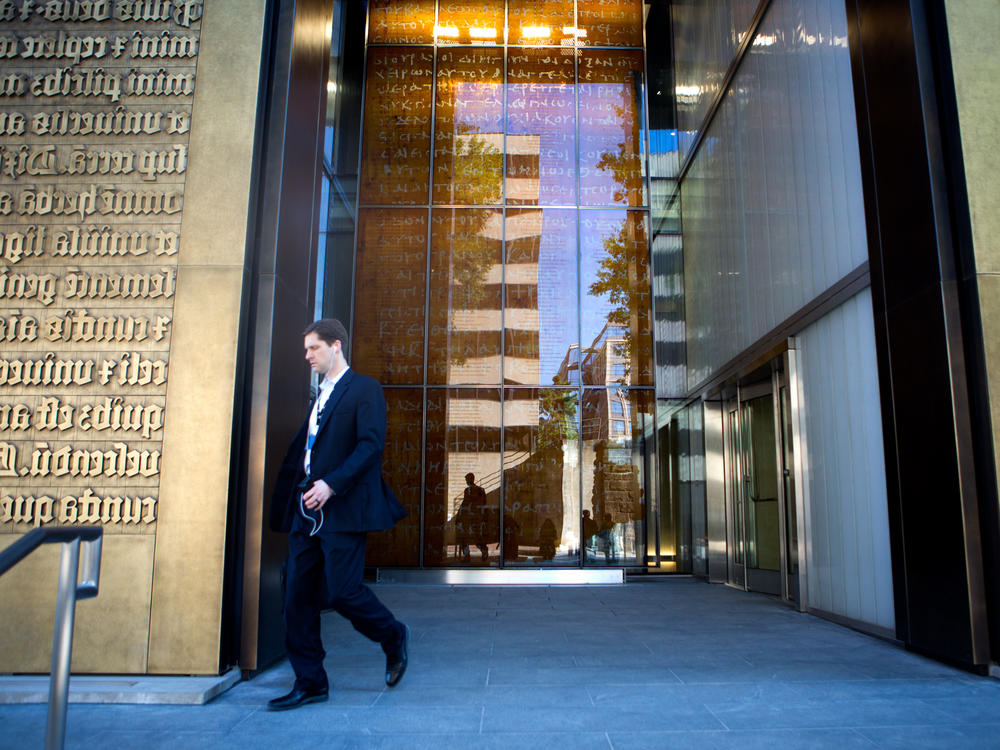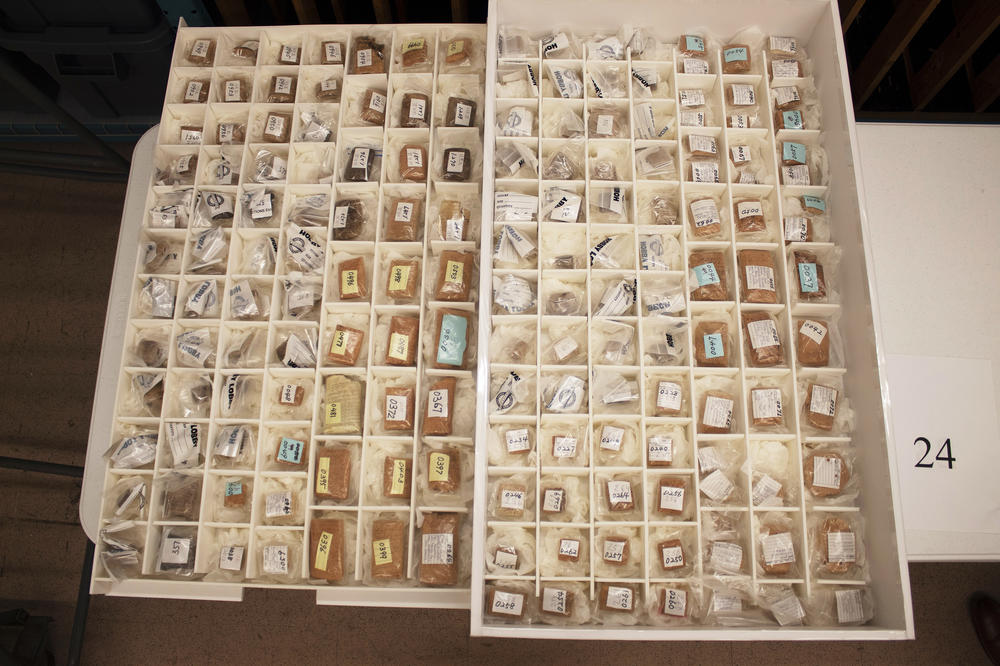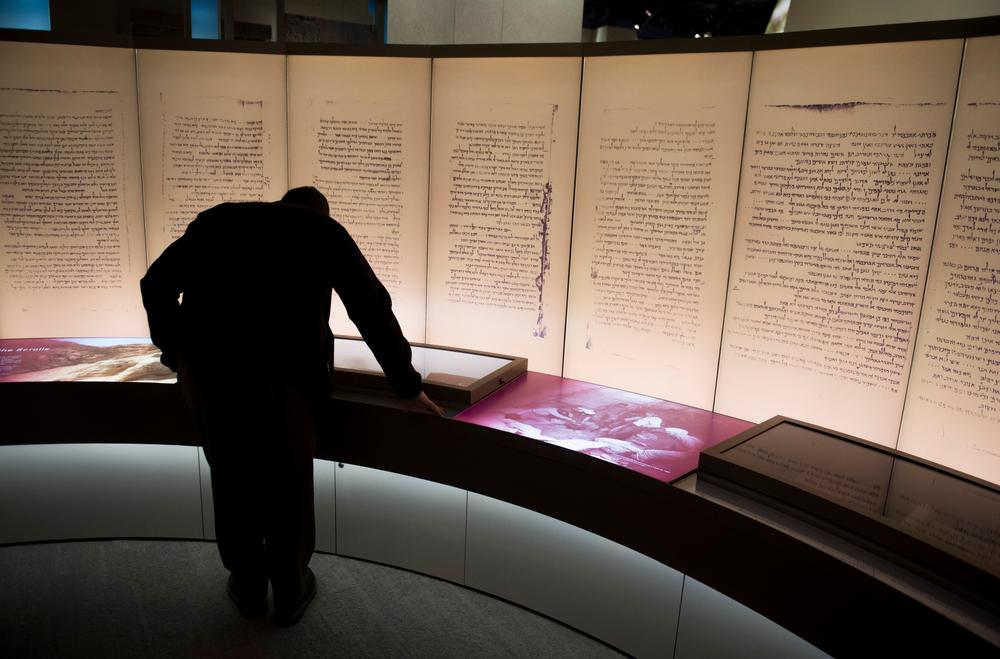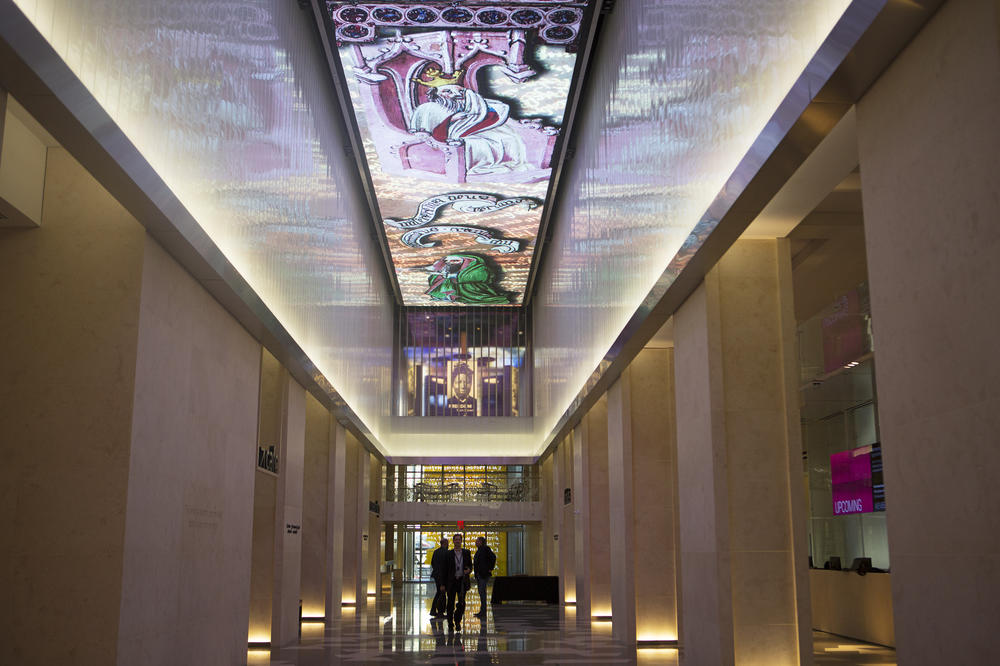Section Branding
Header Content
After 'Missteps' And Controversies, Museum Of The Bible Works To Clean Up Its Act
Primary Content
When the Museum of the Bible opened three years ago, its founders aimed to engage a wider audience with the Bible and its thousands of years of history.
But the museum's ambitious goals have been overshadowed by a series of scandals, still unfolding, over antiquities — acquired in a five-year international shopping spree — that have turned out to be looted or fake.
Now the museum is trying to clean up its act. Museum executives have embarked on a campaign to comply with basic due diligence in authenticating the institution's holdings. The stricter policies, mandated by U.S. federal authorities, include going through the museum's entire 40,000-piece collection and returning potentially looted goods to their countries of origin. But some antiquities experts question why it has taken so long.
The controversial purchases began years before the museum opened. Steve Green, the evangelical president of the Hobby Lobby arts and crafts chain and the museum board's chairman, started acquiring artifacts in 2009 for what would become a $500 million museum on prime Washington, D.C., real estate. (Museum officials have long said the institution has no sectarian or evangelical agenda.)
He has said he knew little about collecting at the time.
"I trusted the wrong people to guide me, and unwittingly dealt with unscrupulous dealers in those early years," Green said in a statement in March. He insisted this was no longer the case.
The same year the museum opened its doors, Hobby Lobby paid a $3 million fine in a Justice Department settlement for not exercising due diligence in acquisitions. The judgment directed the forfeiture of 5,500 clay tablets and other illegally imported items to the Iraqi government.
"After some early missteps," Green said in March, he decided he "would only acquire items with reliable, documented provenance. Furthermore, if I learn of other items in the collection for which another person or entity has a better claim, I will continue to do the right thing with those items."
Even so, fresh controversies — over previously acquired objects, including Dead Sea Scroll fragments found to be fake and items from Iraq, Afghanistan and Egypt — have continued to dog the museum.
"Very vague paperwork"
Chief curator Jeffrey Kloha, who was hired in 2017, after the controversial acquisitions were made, tells NPR that the museum is discussing the return to Iraq of another 8,106 pieces. Hobby Lobby acquired them so haphazardly for the museum, he says, that it may never be known how they came onto the market.
Archaeologists say some of these items may have even come from Iraq's national museum, which was looted after the U.S. invaded Iraq in 2003 and troops failed to protect cultural sites.
"All we have is paperwork, and very vague paperwork," says Kloha, a former professor of the New Testament at Concordia Seminary in St. Louis. "Obviously, there are multiple sources for items from Iraq over the past 30 years. So we have no way of knowing where these came from."
Kloha says Hobby Lobby acquired the items, most of them clay tablets, between 2009 and 2014 from sources in the U.S., the U.K. and Israel. Another 5,000 items, Egyptian papyri and textiles, acquired during the same period, also lack proper documentation. None of these have been displayed in the museum. Kloha describes them as "nothing remarkable."
"They were purchased with scant descriptions," Kloha says. "We can't even tell sometimes which particular item belonged to which acquisition, because it just wasn't documented either at the acquisition point or at the delivery point."
Kloha says a museum investigation conducted by staff and independent scholars has determined that between 5% and 10% of the roughly 8,000 objects now being returned to Iraq are fake. Most were purchased in lots — as many as 2,000 pieces at a time. Kloha says it's not clear whether the buyers commissioned by Hobby Lobby even saw the items before purchasing them. He declined to disclose how much the chain paid for the objects.
The museum announced in March that it would return more than 11,000 of those items to the Iraqi and Egyptian governments. (In subsequently packing up these objects, it became clear that there were 2,000 more Iraqi artifacts, making the total about 13,000.) Kloha says the museum is awaiting confirmation from Iraq that it wants its 8,000-plus pieces returned.
Another batch of antiquities that Hobby Lobby handed to the Iraqi Embassy two years ago is still in the United States. To save on insurance costs, the hope is that they can be sent back on an Iraqi plane during an official visit to the United States, according to the embassy.
Kloha says once it became clear there were problems with provenance — the all-important records of ownership that help prove antiquities are authentic and were legitimately acquired — museum officials stopped research into all the Iraqi and Egyptian artifacts it intends to return.
Forgeries and forfeitures
After inviting scholars to examine one of its prized possessions — purported fragments of the Dead Sea Scrolls, pieces of one of the first known bibles — the museum announced in March that these had been found to be modern forgeries. Kloha says the museum has decided to return the items to their previous owners and could seek legal action to recover the money it paid for them.
Last month, U.S. authorities ordered the museum to forfeit the Gilgamesh Dream Tablet, a roughly 3,500-year-old cuneiform fragment from one of the earliest known creation epics. Authorities said it had been stolen from Iraq and sold by a major auction house with unsupported provenance.
Hobby Lobby has since filed a suit against the Christie's auction firm, alleging that Christie's provided inaccurate documentation when Hobby Lobby bought the tablet for $1.6 million in 2014.
Christie's did not respond to NPR's request for comment on the tablet's forfeiture. It said later that it had not known that the documentation was fraudulent when it sold the tablet.
The Museum of the Bible's latest issue is over an ancient Jewish prayer book from Afghanistan. The museum says it was "legally exported" from the U.K. and "acquired in good faith" with provenance information dating from the 1950s. Now, Kloha says, museum staff believe the book was taken out of Afghanistan after 1998 — decades after a UNESCO convention made it illegal to export antiquities without government approval. The Taliban, which controls many parts of the country today, is accused of widespread trafficking in antiquities.
"We've found quite a bit about that item, and we'll continue to work with external researchers, experts in Afghan culture and history who have been on the ground in Afghanistan," Kloha says.
He says the museum is consulting with scholars from Israel, England and Germany and is "still working on the best resolution" for the item. "There's a pretty strong legal case for holding it," he says.
Warnings ignored
The museum's early acquisitions of thousands of items of uncertain provenance and dubious relevance to the Bible point to both a lack of expertise and lack of policy at the time, Kloha says.
"It seems to have been just one or two individuals who were acting as agents and purchasing things for what was, at that point, just the idea of a museum," he says. "It was a handful of advisers who would literally travel the world, make contacts, find things and then bring them to the Greens for acquisition."
Green, though, personally carried out some transactions.
The U.S. government's 2017 complaint against Hobby Lobby notes that Green was stopped by U.S. Customs and Border Protection in 2010 while carrying a $1 million Bible without a customs declaration.
The following year, U.S. Customs agents seized misidentified cuneiform tablets being shipped to Hobby Lobby from the United Arab Emirates.
"From late 2010 to early 2011, the government seized several of the shipments to [Hobby Lobby] ... yet we find out they continue to buy more things, they continue to ship them in," Patty Gerstenblith, the director of DePaul University's Center for Art, Museum & Cultural Heritage Law in Chicago, tells NPR. "Here you are in the middle of an investigation by the government for illegally importing artifacts — and yet you continue to do the same thing."
Gerstenblith was asked in 2010 by Hobby Lobby's chief counsel to brief him about the laws on importing antiquities. According to the 2017 U.S. judgment against Hobby Lobby, she warned that importing anything of Iraqi origin would incur considerable risk, given that up to 500,000 objects had been looted from Iraq since the 1990s.
She warned specifically that cylinder seals were easily looted. Up to 5,000 were believed to have been stolen from the Iraqi national museum in 2003, she says.
"They are small. They are lightweight. They are easily portable," Gerstenblith explains.
According to the U.S. complaint, Gerstenblith's report was never shared with Green or other Hobby Lobby management — something she didn't learn until she read the complaint.
Hobby Lobby returned some of its cylinder seals to Iraq two years ago.
"Part of all our heritage"
As Washington gradually reopens during the coronavirus pandemic, Kloha says the Museum of the Bible is ready. It's one of two private museums in the city to reopen its doors this week. Even with a roughly $20 admission fee in a city full of free museums, it has become a popular tourist attraction. Visitors have praised its immersive experiences, including museum staff dressed in period costume, and are likely to have little interest in issues of provenance.
But the museum's reputation among scholars has made it difficult to arrange loans of works from other institutions.
Still, Gerstenblith and other heritage experts say the museum appears to be working to overcome past mistakes.
"There's no question to me that the museum is trying to be extremely careful in what they're buying now. They're buying only the best and then making sure that the provenance is squeaky-clean," Sharon Liberman Mintz, curator of Jewish art at the Jewish Theological Seminary library, told The Washington Post. "They don't want to repeat any of the mistakes that they made in the past."
Kloha says it has been difficult dealing with the legacy of previous acquisitions, but the museum's original mission remains the same: "You know, we really are hoping to educate the public about the history of the Bible, the basic stories in the Bible and the impact of the Bible."
In addition to conducting due diligence, investigating potential forgeries and hosting academic conferences, he says, the museum has tightened its acquisition policy. And going forward, he says, the museum is focusing on what it hopes will be less problematic collections. Among those are what Kloha describes as a very large group of early printed books from a collector in Louisville, Ky., including early Puritan thought and writings on slavery and abolition.
Kloha says the museum has transferred legal ownership of roughly 13,000 disputed items to Iraq and Egypt. It is still discussing their physical return and the possibility of Iraq loaning some of these objects to the museum for further study.
Iraqi's ambassador to the U.S., Fareed Yasseen, tells NPR that he would personally like to see Iraqi artifacts exposed to as wide an audience as possible.
"To me, the Elgin Marbles should be in Greece, not in the British Museum, because a lot of people will see them in Greece," he says. "But if you look at the massive winged bulls [from ancient Iraq] you have in the British Museum ... or the Louvre, I mean honestly, if they were in Iraq, so few people would go there to see them. To be fair, looking at the issue as a world citizen, if you will, these are part of all our heritage. Anybody who has read the Bible can relate, right?"
Copyright 2020 NPR. To see more, visit https://www.npr.org.





